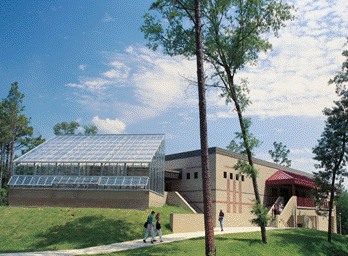Facilities
Learn more about the UWF Department of Biology facilities available biology students.
Marine Research Center
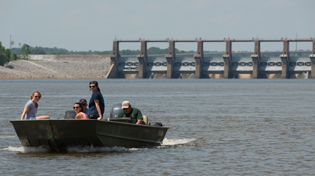
The University of West Florida's Marine Research Center provides diving and research platforms for University-sponsored projects and commercial clients involved in underwater ventures in and around the Gulf of Mexico.
Reference Materials
The University Library has an excellent collection of texts, journals, and reference works to assist the students. A study room with the American Chemical Society journals is located in the science building.
Computer Labs
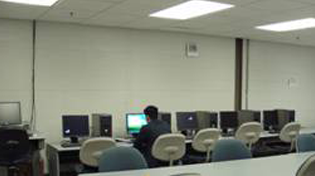
The Department of Biology maintains an open access lab which contains a combination of PCs and Macintosh computers. The use of PCs, consisting of word processing, spreadsheets, commercial programs, and "CAS.org On-line" (computer search of the chemical literature), are an integral part of the coursework.
Greenhouses
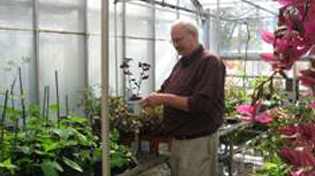
The Biology department maintains two green houses, one for plants and one for marine research. The Biology Department maintains a 600 square foot greenhouse with automated watering and temperature controls adjacent to the Botany Teaching Lab. The greenhouse is used to maintain and propagate a variety of plants used in the botany teaching laboratories, as well as space for undergraduate and graduate research projects in plant physiology, plant biotechnology, and plant development.
Marine Research Facility
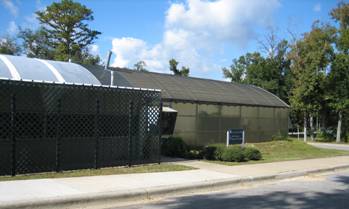
The University of West Florida, Marine Research Facility (MRF) encompasses 3200 sq. ft. of laboratory space dedicated to graduate and undergraduate research. The facility is divided into a photoperiod and climate controlled wet laboratory area and a marine/wetland plant conservatory. The wet laboratory area is equipped with running water both de‑chlorinated freshwater as well as filtered seawater (1500 gallon capacity) - and a regenerative air supply (5000 cubic feet per minute) capable of supporting large aeration or head-box demands. Climate control is maintained during the winter and summer by two thermostatically controlled HVAC units. Students have access to a variety of animal holding tanks ranging between 20 and 750 gallon capacity and equipped with either flow-through or re-circulating biological filtration systems. The conservatory area is outfitted with a 70% shade and is cooled in summer with an evaporative wet-wall and heated in winter by a natural gas heater. While the majority of botanical research projects rely on natural lighting, grow lights with photoperiod control are also available. A 300 sq. ft. public display area boasts a series of 250 gallon exhibits that highlight the seven distinct freshwater, estuary, and marine habitats that exist within an hour’s drive of the University.
Instrumentation
In addition to each of 11 faculty research labs being fully equipped with the standard equipment required to support basic/applied research (freezers and refrigerators, hoods, incubators, water baths, magnetic stirrers, pH meters, vacuum pumps, etc.), the following major pieces of equipment are housed within the research environment in Biology:
- Li-Cor odyssey Fc infrared imaging system
- Confocal microscope: model FLUOVIEW FV10i by Olympus
- Fluorescent compound research microscope (Leica)
- Refrigerated clinical centrifuge
- PerkinElmer Tricarb 2900 Liquid Scintillation Analyzer
- Schimadzu Gas Chromatograph
- Lab line HPLC
- Multiple Refrigerated , superspeed centrifuges
- Multiple BL-II biosafety cabinet s
- Multiple Refrigerated High-speed Microfuge
- Multiple PCR machines
- Ultra Sonicator
- Multiple CO2 Cell culture Cabinets
- Multiple Ultralow freezers
- Desk top Autoclave
- Multiple UV/Vis Genesys Spectrophotomers
- UV/Vs/Fluorescent Microplate Reader
Perkin-Elmer Lambda 4 UV-Visible Spectrophotometer - Nanodrop 2000 spectrophotometer
- 3 prime G Gradient Thermal Cycler
- Electra 700 Coagulation Timer
- Beckman Coulter Counter
- Dade Behring Chemical analyzer
- IEC multispeed refrigerated centrifuge
- Multiple Milli-Q water purification systems
- Multiple environmental chambers (5 walk-ins)
- Biorad Imaging System
- 2800 Cole Parmer, UV/Vis spectrophotometer
- Multiple orbital, shaker incubators
- Biology shares equipment with the Center for Environmental Diagnostics and Bioremediation which is a well-equipped research oriented entity whose faculty hold tenure track lines within Biology - see following web site for equip available through CEDB (http://uwf.edu/cedb/facilities.cfm)
In addition, Biology has a fleet of vehicles used for field research and field courses (2013 Expedition, 2013 Ford PU, two 2012 vans and three older vans, as well as having access to the Marine Service Center fleet of more than a dozen boats of different sizes and capabilities.)



